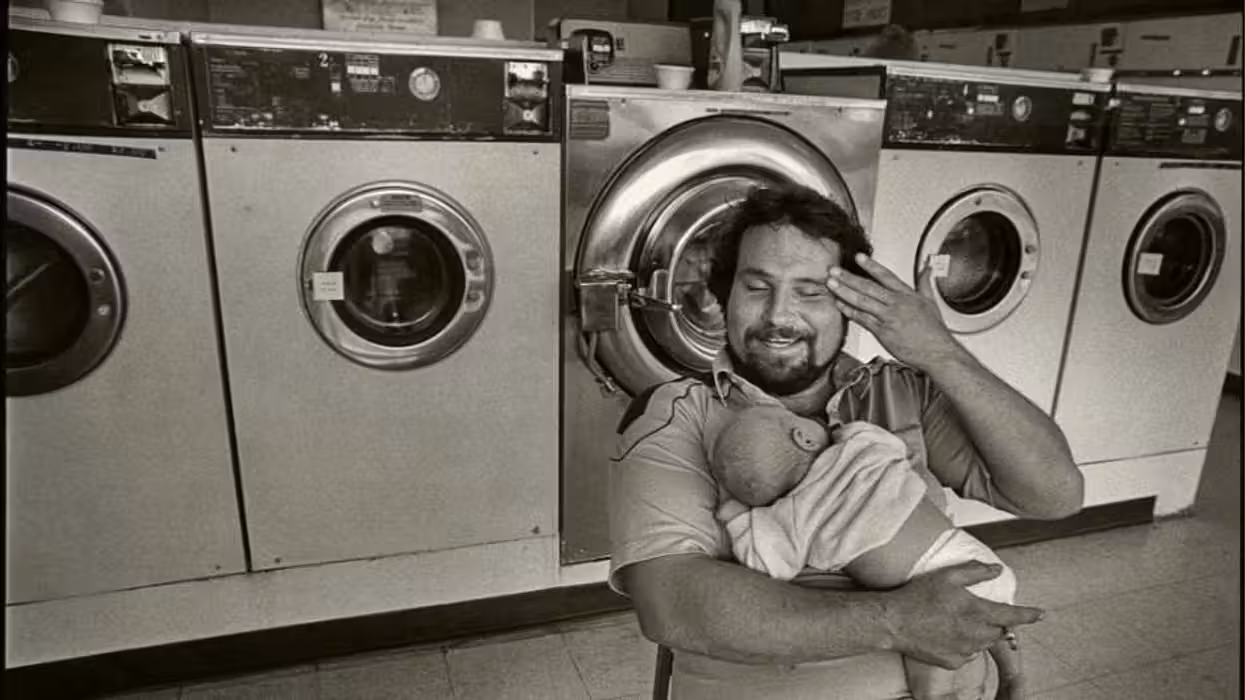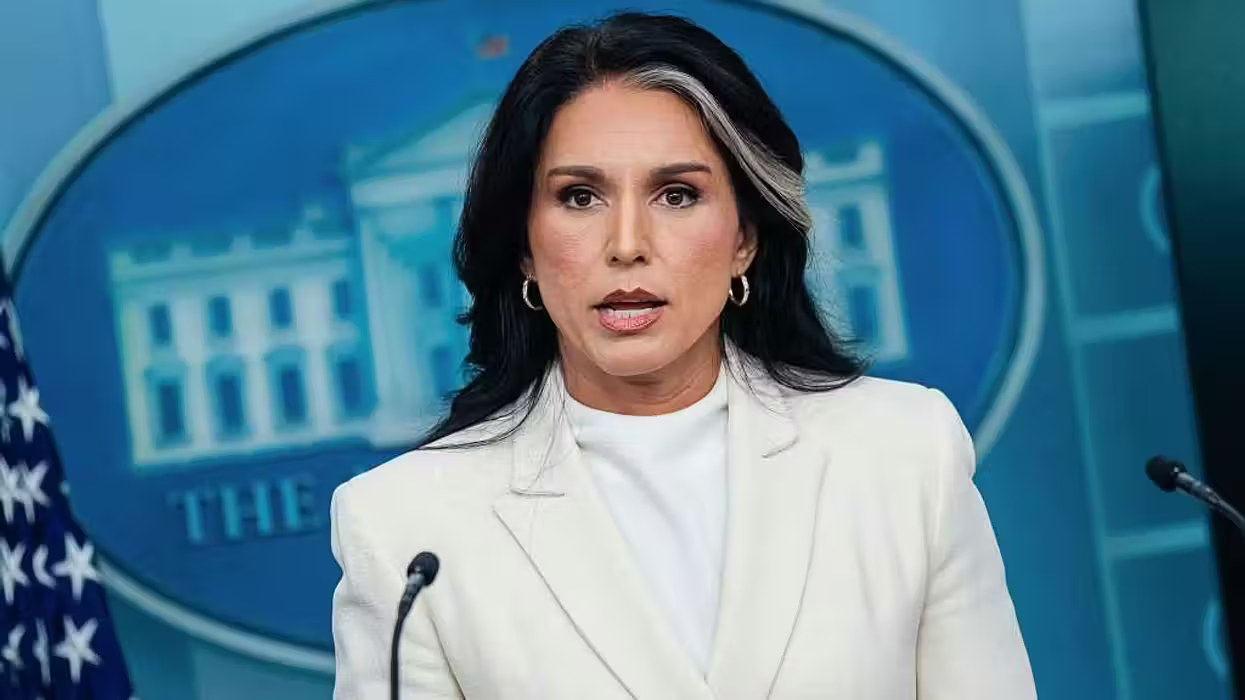WASHINGTON (TheBlaze/AP) -- House Republicans backed away from a battle over the government's debt cap on Tuesday and permitted President Barack Obama's Democratic allies to drive quick passage of a measure to increase the government's borrowing cap without any concessions from the White House.
The 221-201 vote came hours after Speaker John Boehner announced that his fractured party would relent.
Just 28 Republicans voted for the measure, including Boehner. But 193 Democrats more than compensated for the low support among Republicans.
 FILE - In this Feb. 6, 2014 file photo, House Speaker John Boehner of Ohio speaks during a news conference on Capitol Hill in Washington. In a concession to President Barack Obama and Democratic lawmakers, Boehner said Tuesday the House will vote to increase the government's borrowing cap without trying to attach conditions sought by some Republicans. "We'll let his party give him the debt ceiling increase that he wants," Boehner said, hours before the expected evening vote. (AP Photo/J. Scott Applewhite, File)
FILE - In this Feb. 6, 2014 file photo, House Speaker John Boehner of Ohio speaks during a news conference on Capitol Hill in Washington. In a concession to President Barack Obama and Democratic lawmakers, Boehner said Tuesday the House will vote to increase the government's borrowing cap without trying to attach conditions sought by some Republicans. "We'll let his party give him the debt ceiling increase that he wants," Boehner said, hours before the expected evening vote. (AP Photo/J. Scott Applewhite, File)
The move risks more displeasure from the tea party but came after most Republicans in the House made clear they had no taste for another high-stakes fight with President Barack Obama over the nation's debt ceiling, which must be raised so the government can borrow money to pay all of its bills.
The bill would permit the Treasury Department to borrow normally for another 13 months, diffusing the chance of a debt crisis well past the November elections and providing time for a newly elected Congress to decide how to handle the issue.
In total, 221 lawmakers voted for the debt ceiling increase, including 28 Republicans. Additionally, 201 voted against it and 10 didn't vote.
Here's the final vote tally:
---- YEAS 221 ---
| Andrews Barber Bass Beatty Becerra Bera (CA) Bishop (GA) Bishop (NY) Blumenauer Boehner
Bonamici Brady (PA) Braley (IA) Brown (FL) Brownley (CA) Bustos Butterfield Calvert
Camp
Cantor
Capps Capuano Carney Carson (IN) Cartwright Castor (FL) Castro (TX) Chu Cicilline Clark (MA) Clarke (NY) Clay Cleaver Clyburn Coble
Cohen Collins (NY)
Connolly Conyers Cooper Costa Courtney Crowley Cuellar Cummings Davis (CA) Davis, Danny DeFazio DeGette Delaney DeLauro DelBene Dent
Deutch Dingell Doggett Doyle Duckworth Edwards Ellison Engel Enyart Eshoo Esty Farr Fattah Fitzpatrick
Foster Frankel (FL) Fudge Gabbard Gallego Garamendi Garcia | Grayson Green, Al Green, Gene Grijalva Grimm
Gutiérrez Hahn Hanabusa Hanna
Hastings (FL) Hastings (WA)
Heck (WA) Higgins Himes Hinojosa Holt Honda Horsford Hoyer Huffman Israel Issa
Jackson Lee Jeffries Johnson (GA) Johnson, E. B. Kaptur Keating Kelly (IL) Kennedy Kildee Kilmer Kind King (NY)
Kirkpatrick Kuster Langevin Larsen (WA) Larson (CT) Lee (CA) Levin Lipinski LoBiondo
Loebsack Lofgren Lowenthal Lowey Lujan Grisham (NM) Luján, Ben Ray (NM) Lynch Maffei Maloney, Carolyn Maloney, Sean Matsui McCarthy (CA)
McCarthy (NY) McCollum McDermott McGovern McIntyre McKeon
McNerney Meehan
Meeks Meng Michaud Miller, Gary
Miller, George Moore Moran Murphy (FL) Nadler Napolitano Neal | Negrete McLeod Nolan Nunes
O'Rourke Owens Pallone Pascrell Payne Pelosi Perlmutter Peters (CA) Peters (MI) Peterson Pingree (ME) Pocan Polis Price (NC) Quigley Rahall Rangel Reichert
Richmond Rogers (KY)
Roskam
Roybal-Allard Royce
Ruiz Runyan
Ruppersberger Ryan (OH) Sánchez, Linda T. Sanchez, Loretta Sarbanes Schakowsky Schiff Schneider Schrader Schwartz Scott (VA) Serrano Sewell (AL) Shea-Porter Sherman Shimkus
Sinema Sires Slaughter Smith (NJ)
Smith (WA) Speier Swalwell (CA) Takano Thompson (CA) Thompson (MS) Tierney Titus Tonko Tsongas Valadao
Van Hollen Vargas Veasey Vela Velázquez Visclosky Walz Wasserman Schultz Waters Waxman Welch Wilson (FL) Wolf
Yarmuth |
---- NAYS 201 ---
| Amash
Bachmann
Bachus
Barletta
Barr
Barrow (GA) Barton
Benishek
Bentivolio
Bilirakis
Bishop (UT)
Black
Blackburn
Boustany
Brady (TX)
Bridenstine
Brooks (AL)
Brooks (IN)
Broun (GA)
Buchanan
Bucshon
Burgess
Byrne
Capito
Carter
Cassidy
Chabot
Chaffetz
Coffman
Cole
Collins (GA)
Conaway
Cook
Cotton
Cramer
Crawford
Crenshaw
Culberson
Daines
Davis, Rodney
Denham
DeSantis
DesJarlais
Diaz-Balart
Duffy
Duncan (SC)
Duncan (TN)
Ellmers
Farenthold
Fincher
Fleischmann
Fleming
Flores
Forbes
Fortenberry
Foxx
Franks (AZ)
Frelinghuysen
Gardner
Garrett
Gerlach
Gibbs
Gibson
Gingrey (GA)
Gohmert
Goodlatte
Gowdy | Granger
Graves (GA)
Graves (MO)
Griffin (AR)
Griffith (VA)
Guthrie
Hall
Harper
Harris
Hartzler
Heck (NV)
Hensarling
Herrera Beutler
Holding
Hudson
Huelskamp
Huizenga (MI)
Hultgren
Hunter
Hurt
Jenkins
Johnson (OH)
Johnson, Sam
Jones
Jordan
Joyce
Kelly (PA)
King (IA)
Kingston
Kinzinger (IL)
Kline
Labrador
LaMalfa
Lamborn
Lance
Lankford
Latta
Long
Lucas
Luetkemeyer
Lummis
Marchant
Marino
Massie
Matheson McAllister
McCaul
McClintock
McHenry
McKinley
McMorris Rodgers
Meadows
Messer
Mica
Miller (FL)
Miller (MI)
Mullin
Mulvaney
Murphy (PA)
Neugebauer
Noem
Nugent
Nunnelee
Olson
Palazzo
Paulsen
Pearce | Perry
Petri
Pittenger
Pitts
Poe (TX)
Pompeo
Posey
Price (GA)
Reed
Renacci
Ribble
Rice (SC)
Rigell
Roby
Roe (TN)
Rogers (AL)
Rogers (MI)
Rohrabacher
Rokita
Rooney
Ros-Lehtinen
Ross
Rothfus
Ryan (WI)
Salmon
Sanford
Scalise
Schock
Schweikert
Scott, Austin
Sensenbrenner
Sessions
Shuster
Simpson
Smith (MO)
Smith (NE)
Smith (TX)
Southerland
Stewart
Stivers
Stockman
Stutzman
Terry
Thompson (PA)
Thornberry
Tiberi
Tipton
Turner
Upton
Wagner
Walberg
Walden
Walorski
Weber (TX)
Webster (FL)
Wenstrup
Westmoreland
Whitfield
Williams
Wilson (SC)
Wittman
Womack
Woodall
Yoder
Yoho
Young (AK)
Young (IN) |
---- NOT VOTING 10 ---
| Aderholt
Amodei
Campbell
Cárdenas | Gosar
Latham
Lewis Pastor (AZ) | Rush Scott, David |
-
The Republicans who voted for the "clean" debt limit increase include:
House Speaker John Boehner (R-Ohio), Rep. Dave Camp (R-Mich.), Rep. Eric Cantor (R-Va.), Rep. Darrell Issa (R-Calif.), Rep. Peter King (R-N.Y.), Rep. Ken Calvert (R-Calif.), Rep. Howard Coble (R-N.C.), Rep. Chris Collins (R-N.Y.), Rep. Charlie Dent (R-Pa.), Rep. Michael Fitzpatrick (R-Pa.), Rep. Michael Grimm (N.Y.), Rep. Doc Hastings (R-Wash.), Rep. Frank LoBiondo (R-N.J.), Rep. Kevin McCarthy (R-Calif.), Rep. Buck McKeon (R-Calif.), Rep. Patrick Meehan (R-Pa.), Rep. Gary Miller (R-Calif.), Rep. Devin Nunes (R-Calif.), Rep. Dave Reichert (R-Wash.), Rep. Hal Rogers (R-Ky.), Rep. Peter Roskam (R-Ill.), Rep. Ed Royce (R-Calif.), Rep. Jon Runyan (R-N.J.), Rep. John Shimkus (R-Ill.), Rep. Chris Smith (R-N.J.), Rep. David Valadao (R-Calif.), Rep. Richard Hanna (R-N.Y.), and Rep. Frank Wolf (R-Va.).
Unsurprisingly, most of the lawmakers represent left-leaning states like New York, California, New Jersey and Illinois.
Just a few of the just as unsurprising names who voted against the debt limit increase:
Rep. Louie Gohmert (R-Texas), Rep. Trey Gowdy (R-S.C.), Rep. Ted Poe (R-Texas), Rep. Justin Amash (R-Mich.) and Rep. Michele Bachmann (R-Minn.). See the full list above.
Just Monday, Republicans suggested pairing the debt measure with legislation to roll back a recent cut in the inflation adjustment of pension benefits for working age military retirees. Democrats insisted on a debt measure completely clean of unrelated legislation.
"The full faith and credit (of the United States) should be unquestioned and it is not negotiable," said House Minority Leader Nancy Pelosi, D-Calif.
The vote comes four months after Washington defused a government shutdown and debt crisis that burned Republicans politically - an experience they did not want to repeat.
Tuesday's developments, which many Capitol Hill insiders saw coming, mark a reversal of the GOP's strategy of trying to use the debt limit to force spending cuts or other concessions on Obama. The president yielded to such demands in 2011 - before his re-election - but has since boxed in Republicans by refusing to negotiate.
"I am disappointed that Democrats have walked away from the table," said Dave Camp, R-Mich., the glum chairman of the Ways and Means Committee. "But for as disappointed as I am, I cannot in good conscience let the Democrats' refusal to engage, lead to a default."
Boehner, R-Ohio, made the announcement after conservatives failed to rally around his latest plan, floated Monday, to tie lifting the debt ceiling to a measure to reverse cuts to military pensions that were enacted less than two months ago. Earlier plans to tie a debt cap increase to approval of the Keystone XL pipeline or repeal of part of the new health care law failed as well, stymied by a group of hard line conservatives who vowed never to vote for increasing the government's debt, which stands at more than $17 trillion.
The measure does not raise the debt limit by a set amount but would suspend it through March 15, 2015, to allow Treasury to borrow the money it needs to pay bills like Social Security benefits, payments on government debt, and checks for federal workers.
The move reflects a return to the old ways of handling the politically tricky debt ceiling vote in which the president's party is expected to carry most of the load to pass it.
"We'll let the Democrats put the votes up," the speaker said. "We'll put a minimum number of (GOP) votes up to get it passed."
"That's how it's supposed to work," said Vice President Joe Biden at the Capitol after swearing in the newest senator, John Walsh, D-Mont.
Boehner said his inability to assemble 218 GOP votes - enough to win a floor vote - for any debt limit plan left him no alternative but to turn to Democrats.
"When you don't have 218 votes, you have nothing," Boehner said. "We've seen that before and we see it again."
 President Barack Obama and first lady Michele Obama stand and applaud after USAID administrator Raj Shah spoke at the 62nd National Prayer Breakfast in Washington, Thursday, Feb. 6, 2014. (AP Photo/Charles Dharapak)
President Barack Obama and first lady Michele Obama stand and applaud after USAID administrator Raj Shah spoke at the 62nd National Prayer Breakfast in Washington, Thursday, Feb. 6, 2014. (AP Photo/Charles Dharapak)
The White House applauded the move. Gene Sperling, director of the White House's National Economic Council, said the administration hopes Tuesday's development means "that the tactic of threatening default or threatening the full faith and credit of the United States for budget debates is over, off the table and never is going to happen again. And if so that would, I think, be a boost for confidence and investment in the US."
Obama's refusal to negotiate, GOP disunity, and Boehner's determination to avoid the possibility of a market-cratering default on U.S. obligations gave the Ohio Republican little choice but to announce the vote on a "clean" debt ceiling increase.
"It's disappointing but we have an intractable White House," said Rep. Doug LaMalfa, R-Calif. "This is a hard deal for us but it's also important that we keep the country operating and the financial markets stable, so this is the thing we have to take until somehow there's a change in attitude in the Senate or the White House or a change of occupancy of the Senate or the White House."
The announcement amounted to resigned defeat for a party that has sought to use must-pass debt ceiling measures as leverage to force spending cuts on Democrats. Republicans won more than $2 trillion in spending cuts in a 2011 showdown, but gave Obama two debt limit increases last year with only modest add-ons.
"The Democrats got burned when we negotiated and that led to the sequester, and we learned our lesson," said Rep. Peter Welch, D-Vt. "And the Republicans got burned when they shut the government down."
The House voted 326-90 Tuesday on separate legislation to restore full cost-of-living increases that were to have been cut by 1 percent for retirees under 62. The cuts, which had just passed in December, were backed by House Budget Committee Chairman Paul Ryan, R-Wis. Repealing them would cost $7 billion over the coming decade, the Congressional Budget Office said Monday.
The reduction caused an uproar among advocates for veterans, and lawmakers in both parties are scrambling to repeal it.

 FILE - In this Feb. 6, 2014 file photo, House Speaker John Boehner of Ohio speaks during a news conference on Capitol Hill in Washington. In a concession to President Barack Obama and Democratic lawmakers, Boehner said Tuesday the House will vote to increase the government's borrowing cap without trying to attach conditions sought by some Republicans. "We'll let his party give him the debt ceiling increase that he wants," Boehner said, hours before the expected evening vote. (AP Photo/J. Scott Applewhite, File)
FILE - In this Feb. 6, 2014 file photo, House Speaker John Boehner of Ohio speaks during a news conference on Capitol Hill in Washington. In a concession to President Barack Obama and Democratic lawmakers, Boehner said Tuesday the House will vote to increase the government's borrowing cap without trying to attach conditions sought by some Republicans. "We'll let his party give him the debt ceiling increase that he wants," Boehner said, hours before the expected evening vote. (AP Photo/J. Scott Applewhite, File)






